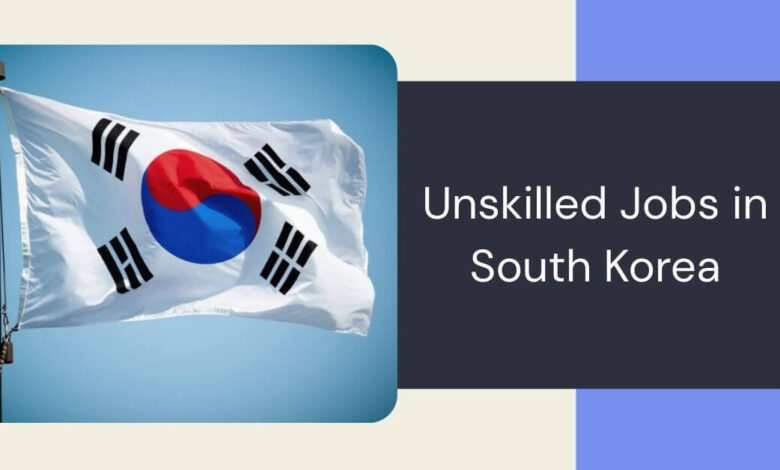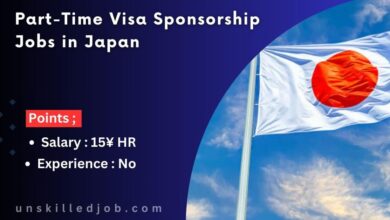Unskilled Jobs in South Korea 2025 – Visa Sponsorship

Unskilled jobs in South Korea create great opportunities for foreign workers who want to start fresh and earn a stable income without needing advanced qualifications. Salaries for these positions generally range from KRW 22,00,000 to KRW 28,00,000 per month (around USD $1,600 to $2,100), depending on the industry, location, and working hours.
Most of these jobs are entry-level and require little to no prior experience, as employers often provide on-the-job training. Since they are usually in industries like manufacturing, agriculture, construction, hospitality, and cleaning services, the majority of roles are on-site and physical jobs rather than remote. For motivated individuals, these positions offer not just steady employment but also the chance to experience South Korea’s vibrant culture, strong work ethic, and opportunities for long-term growth.
Website to find Unskilled Jobs in South Korea:
The South Korean Labor Market:
Foreign laborers have access to a diverse array of opportunities in the South Korean labor market. In this section, we will investigate the employment landscape for incompetent individuals.
List of Unskilled Jobs in South Korea:
Manufacturing Industry:
Numerous manufacturing companies in South Korea necessitate menial labor. Roles in factories, assembly lines, and packaging are frequently encountered in this sector.
Agriculture and Farming:
Unskilled labor is also welcomed in the agricultural sector. A variety of occupations are available on farms, such as livestock management and crop cultivation.
Construction Industry:
The construction industry in South Korea is experiencing significant growth, which has resulted in a demand for unskilled labor in a variety of positions, including construction site laborers, assistants, and cleaners.
Service Sector:
The service sector offers employment opportunities for unskilled workers, such as positions in retail, hospitality, and restaurants.
Visa Sponsorship:
E-9 Non-Professional Employment Visa:
The E-9 visa is intended for individuals who are not highly trained. Applicants must satisfy the requisite qualifications and secure an employment offer from a South Korean employer to obtain this visa.
Eligibility Criteria:
To be eligible, applicants must satisfy specific criteria, such as criminal record checks, health, and age.
Application Process:
We will guide you through the process of applying for an E-9 visa, from obtaining a job offer to submitting the necessary documentation.
Sponsorship by Employers:
Comprehending the function of South Korean employers in sponsoring visas for unskilled workers
Benefits of Unskilled Jobs in South Korea:
- Competitive Wages: South Korea’s wages for menial labor are often substantially higher than those of many of its domestic counterparts, particularly those in Southeast Asia and Africa. This allows workers to send considerable remittances back to their families, thereby enhancing their standard of living.
- Economic Opportunities: The demand for menial labor in sectors such as manufacturing, agriculture, construction, and services is generated by South Korea’s expanding economy and diverse industries. This offers a plethora of employment opportunities for foreign laborers.
- Legal Employment Framework: South Korea has a structured visa and work permit procedure that enables foreigners to work legally. This is known as the Legal Employment Framework. Foreign laborers are guaranteed legal status and safeguarded by South Korean labor laws through initiatives such as the Employment Permit System (EPS).
- Living Standards: South Korea provides a high standard of living, with access to quality healthcare, education, and infrastructure. Compared to their countries of origin, workers may experience enhanced living conditions.
- Cultural Experience: Working in South Korea provides foreigners with the opportunity to interact with locals, acquire the Korean language, and fully immerse themselves in a new culture. The personal experience of this cultural exchange can be rewarding and can broaden one’s global perspective.
- Skill Development: Although the positions may be classified as menial, employees frequently receive on-the-job training that enables them to acquire new skills. These abilities may prove advantageous for prospective employment prospects, whether they are located in South Korea or at home.
- Opportunities for Networking: Working in South Korea offers the chance to establish a network of contacts across a variety of industries. These connections may prove advantageous for future employment opportunities and personal development.
Check Also: Unskilled Jobs in Poland For Foreigners – Apply Now
Challenges Faced by Unskilled Workers:
Language Barrier:
Unskilled laborers in South Korea may encounter substantial difficulties when confronted with the language barrier.
Cultural Adjustment:
For certain individuals, the process of adjusting to a new culture and lifestyle can be overwhelming.
Work Conditions:
Workers may encounter obstacles associated with their work environments, and unskilled occupations may be physically taxing.
Conclusion:
You can develop both personally and professionally by obtaining a visa and working as an inexperienced worker in South Korea. If individuals are prepared and aware of their actions, they can embark on this voyage and encounter a distinctive blend of work and society.
Frequently Asked Questions:
-
What is the minimum age to work in Korea?
Persons 15 to 18 years of age may not work more than seven hours a day or 40 hours a week. Employees under the age of 18 cannot work between 10 p.m. and 6 a.m. or on holidays unless they provide their consent or the employer obtains approval from the MOEL.
-
How do I get a job in Korea after leaving Pakistan?
Anyone can work in South Korea, provided they have a working visa.
Depending on the field you’re choosing to work in, your ethnic background matters a lot.
Other than a visa and a degree, I’d say speaking Korean is a must.
Also, studying the Korean work culture would help immensely. -
What is the easiest job to get in South Korea?
Best of luck with your Korean job hunt! * Of course, teaching English is another option, and this is probably the easiest job in Korea to get if you come from one of the officially designated English-speaking countries.




